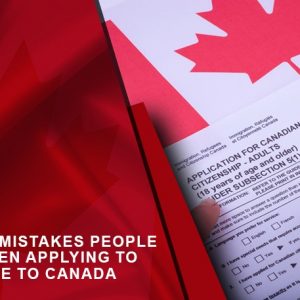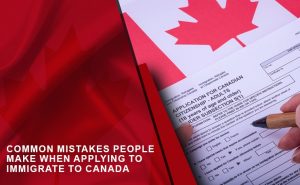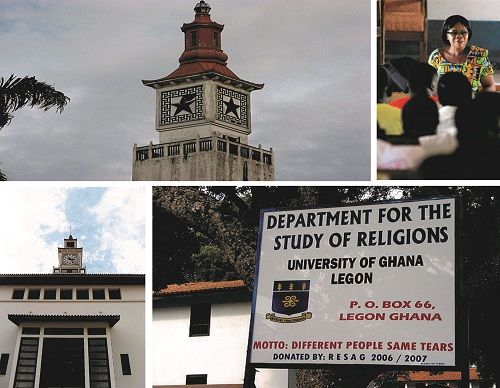Common Canadian Immigration mistakes can result in serious repercussions and possibly mean the end of an individual’s chances for Canadian immigration. Regardless of whether you choose a legal professional to represent you, we want to see you succeed this is why help you put together the following most common mistakes we see applicants make when applying for Canadian immigration.
There are more than 60 Canadian immigration programs, with each having its own unique set of criteria. Citizenship and Immigration Canada (CIC) puts every effort to design programs with clear requirements. However, applications are returned or rejected every year due to common mistakes made by applicants.
These common Canadian Immigration mistakes are accidentally made by the applicant. These mistakes can sometimes be corrected and an application resubmitted. Below are SEVEN carefully curled out mistakes that applicants for permanent residency, temporary work, and even visitor visas should beware.
COMMON CANADIAN IMMIGRATION MISTAKES
1. Inconsistencies in Personal and Educational History
Applications for permanent residency, including applications for temporary residency, require individuals to give a detailed list of their travel history, personal history, and/or educational history. There should not be obvious gaps in this history. Unexplained periods of time, even as small as a week, must be properly explained.
To avoid this mistake, make sure you even state short vacations on your travel history. For personal history, account for periods of time when you were unemployed. You should double-check this part of your application “very well” to ensure that dates properly align. These dates should also go with supporting documents like letters of reference.
2. Language Test Scores are Insufficient
Proof of proficiency in either English or French is required in many Canadian permanent residency programs. Proficiency is defined according to the Canadian Level Benchmark (CLB) system.
Different types of standardized tests may be accepted for proof of language ability based on the immigration program under which you are applying. Applicants are expected to meet minimum CLB levels in all language abilities evaluated for a program. These abilities include reading, writing, speaking, listening, or a combination of the four.
For example, one of the accepted tests as proof of English proficiency for the Federal Skilled Worker Program is the International English Language Testing System (IELTS). Applicants who are submitting IELTS scores are required to meet a minimum of CLB level 7 in all four language abilities.
This means you must have a score of 6.0 in each language ability. If you even scored less than 6.0 in one ability, the applicant will be tagged ineligible for immigration through this program.
Therefore you must avoid this painful mistake by double-checking the language requirements for your specific program. Do your best to exceed the minimum levels in each of the language ability.
3. Waiting Too Long To Submit
If you have a qualifying application, make sure to submit as soon as possible while you still can. Provincial nominee programs usually change from time to time, and immigration categories open and close quickly. If you don’t have an application in the Express Entry pool, you could miss out on immigration opportunities.
So the solution to avoiding this mistake is to submit your application quickly while you are eligible to apply.
4. Listing Ineligible Dependents
When you are making applications for Canadian permanent residency, only spouses, common-law partners, and/or eligible biological or legally adopted children are the individuals you can list as dependents as a principal applicant.
But this limitation is misunderstood. The common mistakes some applicants usually make is that they list other family members such as parents or siblings as dependents. These individuals may not be included on an application, and doing so may slow down the application’s processing time.
To avoid a denial, make sure you only list your eligible dependents as dependents.
5. Employment Letters Do Not Comply with Requirements
Most programs require that you prove your work experience in your resume by providing an employment letter. These letters given to you by current and/or previous employers will explain the kind of work you have performed on a day-to-day basis.
The following information will be requirements you must include in your reference letters:
- Position held
- Hours
- Salary and working conditions
- Description of job duties
- Employer’s signature
- Printed on company letterhead
- Company information such as address and contact information
If the above requirements are not met, Recruiters or employers may reject your employment letter as proof of the applicant’s work experience.
Save the embarrassment by checking the employment letters that you have received. Providing an employer with a basic template that outlines these requirements will help too.
6. Misrepresentation
One of the common Canadian Immigration mistakes is that of misrepresentation. Misrepresentation is a serious immigration offense frowned at. Your application can be rejected and you could be barred from applying for Canadian immigration for 10 years.
Avoid misrepresentation by being honest about the details of your application, as well as your career history and any medical or criminal record that you or anyone one of your eligible dependents on your application have had. Including Social Media Accounts for your application.
Not all medical or criminal records are of any barrier to Canadian immigration. If you are not sure of what is worth and isn’t worth mentioning, consult an immigration attorney or just list anything of concern and hope that the visa officer uses his/her discretion.
7. Using an Unauthorized Representative
To minimize common Canadian Immigration mistakes like those above, many Nigerians prefer to hire the service of an immigration representative to assist them with their application. these representatives may be paid or unpaid, but if paid, that person must be an authorized lawyer or immigration consultant by the government to assist Canadian immigration applicants.
Applicants should beware of fraudsters who pretend to be immigration representatives when they are not even authorized to represent individuals. These phony representatives are not responsible to the government or a professional member of any organization, and will often request huge sums of money for a ‘guaranteed’ visa.
To avoid this mistake if you are looking for a representative, be smart enough to ask for their professional credentials. An immigration lawyer should be a registered member with the law society in their province of residence and be an immigration consultant by the ICCRC (Immigration Consultants of Canada Regulation Council).
In Conclusion
It is very important that Nigerian applicants get it right the first time with so many immigration programs popularly jingled. It would be a shame to see an application rejected because of avoidable common Canadian Immigration mistakes.
The process of coming to Canada as a visitor, worker, student, or permanent resident, can result in a life-changing opportunity for applicants and their families. Because of this, it is very important that individuals carefully complete their applications. With a little work and careful planning, you can make sure that your goals are not dashed out by an easily avoidable mistake.





















can IChat to join you pls